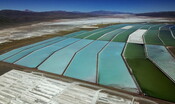A new technology can extract lithium from brines at an estimated cost 40 percent less than the dominant extraction method and at just a quarter of the current market price of lithium. The new technology would also be much more reliable and sustainable in its use of water, chemicals and land than today’s technology, according to a new study. a study published in Matter by researchers at Stanford University. Global demand for lithium has increased in recent years, driven by the rise of electric vehicles and renewable energy storage. The dominant source of lithium extraction today is by evaporating brines in huge ponds under the sun for a year or more, leaving behind a lithium-rich solution, after which a heavy use of potentially toxic chemicals finishes the job.
“The efficiency and cost advantages of our approach make it a promising alternative to current extraction techniques and a potential game changer for the lithium value chain,” said Yi Cui, lead author of the study and a professor of materials science and engineering in the School of Engineering. The research team estimates that its approach costs between $3,500 and $4,400 per ton of high-purity lithium hydroxide, which can be converted to lithium carbonate, compared to costs of about $9,100 per ton today.
Cui and his team’s new method uses electricity to move lithium through a solid-state electrolyte membrane from water with a low lithium concentration to a more concentrated, high-purity solution. Each of a series of cells increases the lithium concentration to a solution from which final chemical isolation is relatively easy. This approach uses less than 10 percent of the electricity required by current mining technology brine and has nearly 100 percent lithium selectivity, making it highly efficient. “The advantages our approach shows over conventional lithium extraction techniques enhance its feasibility for producing environmentally friendly and cost-effective lithium,” said study co-lead author Rong Xu, a former postdoctoral researcher in Cui’s lab who is now a faculty member at Xi’an Jiaotong University in China.

http://www.hislibris.com/foro-new/profile.php?mode=viewprofile&u=75712
http://glennsfbradley.minitokyo.net/
https://www.temptalia.com/members/sonnysflowery
https://www.mobafire.com/profile/emerysfmarshall-1166439/
https://gamesdreamsonline.com/member.php?314554-gemmasfingram
http://www.neighborhoodlink.com/people/franciscosfglover
https://www.rvparking.com/user/492752
http://quomon.es/Profile/izayahsfmoon
https://www.todoexpertos.com/usuarios/elainamason
http://boreal.yclas.com/user/shannonfritz
http://www.metal-archives.com/users/anthonysfwiley
https://logopond.com/sariahsfsampson/profile/698500/?filter=&page=
https://kitsplit.com/jadensfwheeler/
https://groovestats.com/index.php?page=profile&id=185259
https://creativemornings.com/people/izayahsfmoon
https://beginnertriathlete.com/discussion/view-profile.asp?action=view&uid=590678
https://bitcointalk.org/index.php?action=profile&u=3653499
https://www.audiodraft.com/user/profile/vansfswanson
http://aprelium.com/forum/profile.php?mode=viewprofile&u=4246734
http://www.neighborhoodlink.com/people/karsonsflyons
https://paizo.com/people/jairsfduran/
https://www.rvparking.com/user/492748
https://www.questforsourdough.com/user/47194/
https://www.todoexpertos.com/usuarios/marybolton
https://groovestats.com/index.php?page=profile&id=185252
http://www.hislibris.com/foro-new/profile.php?mode=viewprofile&u=75718
http://andreassfparrish.minitokyo.net/
https://www.temptalia.com/members/ivysfball
https://www.mobafire.com/profile/antonysfhouston-1166444/
https://beginnertriathlete.com/discussion/view-profile.asp?action=view&uid=590672
http://quomon.es/Profile/mathewsfhartman
http://aprelium.com/forum/profile.php?mode=viewprofile&u=4246973